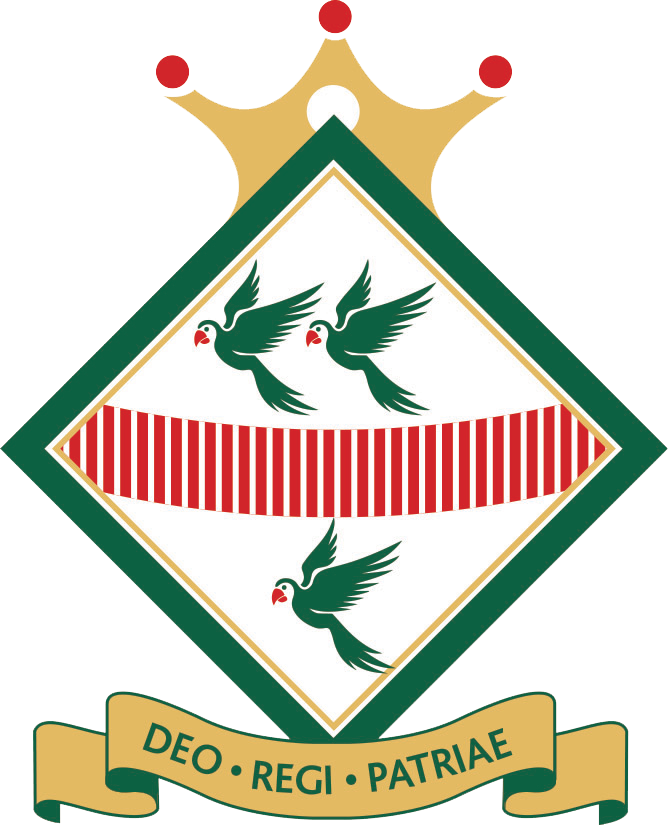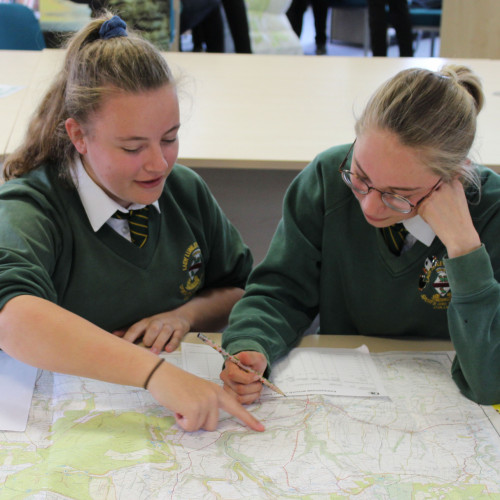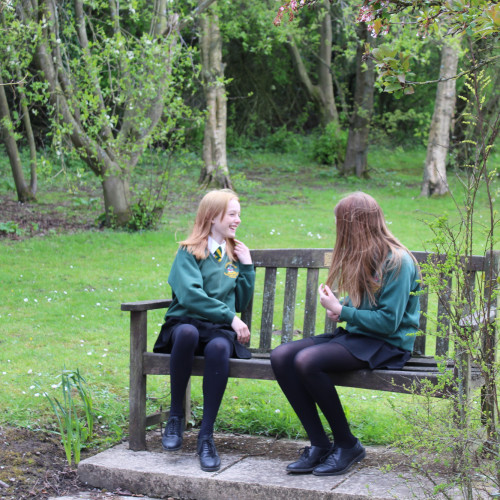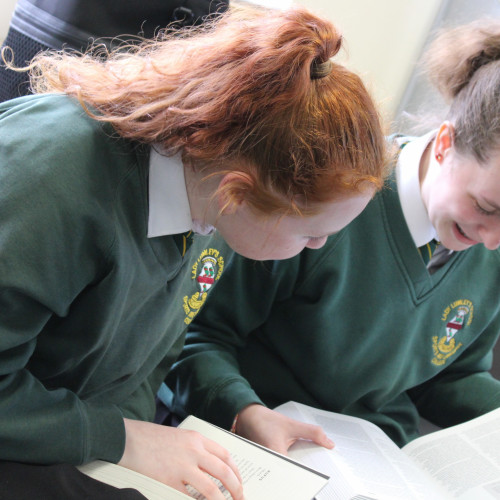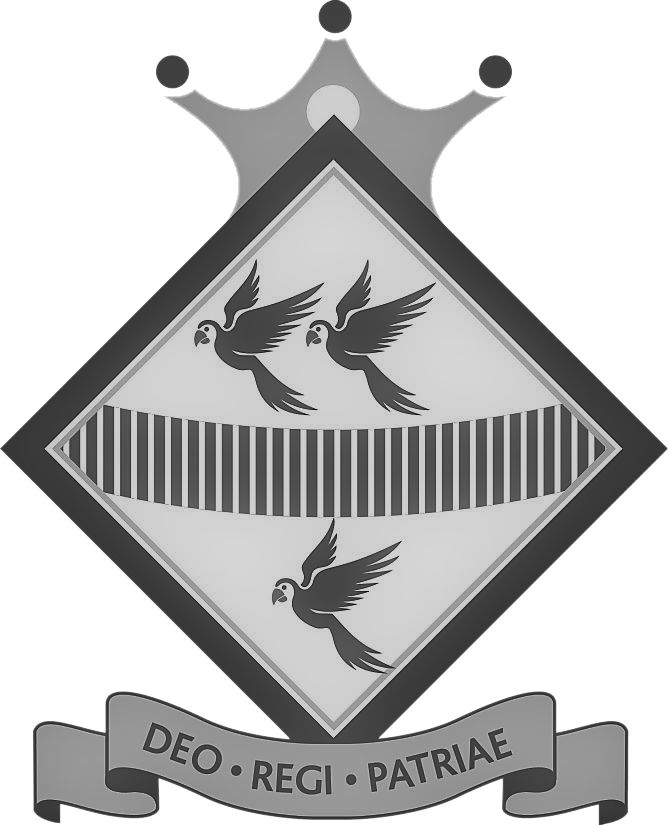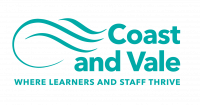English
Key Stage 3
English forms the basis for our development, relationships and our understanding of the world around us. The study of English is key to our personal growth and, through the development of effective written and spoken communication, it is the foundation for all our learning. The ability to communicate effectively, confidently and with clarity is crucial in school, but also in becoming an effective participant in our wider society with skills of communication being key to accessing the world of work and in navigating adult life. In a fast paced, global world the importance of fluent written and spoken English is crucial and it is essential that we develop these skills through an effective English curriculum.
From Year 7, students will be building on the foundations of the primary curriculum through a systematic exposure to a wide range of high-quality literature. We not only promote reading for enjoyment to ignite a curiosity in students, but also as a way of acquiring knowledge and exploring the world in ways that develop a student’s cultural and emotional intellect. Our Secondary Reading Strategy recognises the barriers students face in accessing challenging texts such as: complexity of narrator, non-linear time sequences, complexity of story or archaic texts and encourages students to confidently explore and probe the literal and layered meanings in the texts they read. Through our curriculum we actively encourage students to develop their close reading skills so they can confidently and methodically break down the language and structure of a complex passage to establish and analyse meaning. Furthermore, in order to develop accountable and independent readers, we have designed a curriculum which requires different types or layers of reading which is supported by text dependent questions and where possible, with mastery shown through a range of writing opportunities
As our students progress through the English curriculum, they are continually developing their close reading skills through exposure to increasingly challenging fiction and non-fiction, which include works by 19th, 20th and 21st century writers. We want our students to be able to engage with a range of texts with confidence and to develop their skills in decoding difficult texts, gathering carefully selected evidence, evaluating texts in detail and possessing the ability to explore multiple texts simultaneously to formulate and articulate personal viewpoints. The development of these skills feeds directly into their study of spoken language and the importance of verbal communication in accessing the world around them. Opportunities have been created for students to debate and discuss their ideas through a range of individual and group presentations, speeches, performing plays and reading aloud. We firmly believe that exposure to a range of opportunities builds a confidence in students and allows them to develop their life-long skills in verbal communication.
Confidence, control and accuracy in a range of writing is developed through frequent opportunities to write for a range of audiences and purposes. It is important that students use writing as an opportunity to formulate and develop their ideas and in using writing as a way to think critically about a topic and express their point of view. Across all writing activities, students are exposed to the importance of accuracy and the ability for students to construct and revise sentences for effect and impact is vital. In order to develop their skills, students are encouraged to expand their use of vocabulary through probing and investigating the nuances of language in order to enhance their written expression and clarity.
The English curriculum in our schools is robust and systematic in exposing students to effective challenge, so they can build and refine long-lasting skills for the future. Subsequently, we offer a curriculum which has appropriate challenge for all students and aims to allow students to flourish in the skills required for success in their chosen KS4 and post 16 pathways.
Year 7
Autumn Term
Big Question: How can conflict shape our experiences?
Core Text: The Machine Gunners by Robert Westall
Students read a novel set during the Second World War and follows six children who live in the fictional town of Garmouth. One of the children finds a crashed German plane and he removes both the machine gun and live ammunition. The friends then set up their own den before capturing and imprisoning a German gunner.
Spring Term
Big Question: What qualities allow people to survive in difficult circumstances?
Core Text: The Boys in the Boat by Daniel James Brown
Students study this work of literary non-fiction, which is set out of the depths of the Great Depression. This is an astonishing tale of nine working class boys from the American West who, at the 1936 Olympics, showed the world what true grit really meant. With rowers who were the sons of loggers, shipyard workers and famers, they never expected to defeat the elite East Coast teams, yet they did, and went on to shock the world by challenging the German boat rowing for Adolf Hitler.
Summer Term
Big Question: When is there a difference between appearance and reality?
Core Text: The Tempest by William Shakespeare
This late comedy by Shakespeare tells the story of Prospero, long exiled from Italy with his daughter Miranda, who seeks to use his magical powers to defeat his former enemies. Eventually, having proved merciful, he divests himself of that magic (his ‘art’) and prepares to return to the mainland. Often regarded as Shakespeare’s farewell to the stage before his retirement, this imaginative fantasia can also be studied as political drama which offers controversial insights into colonialism and racism.
Year 8
Autumn Term
The Big Question: How can power corrupt?
Core Text: Animal Farm by George Orwell
Students study an allegorical text written in 1945 about the Russian Revolution which rocked Russia and the world. The animals in the story have direct similarities to key people in the Soviet Union. Through the animals the students see how the Soviet government manipulated socialist ideas to create equality among the working classes and oppress its people to maintain power.
Spring Term
Big Question: How do you overcome adversity?
Core Text: Born a Crime by Trevor Noah
In this literary non-fiction text, Trevor Noah (host of The Daily Show) shares his remarkable story of growing up in South Africa, with a black South African mother and a white European father at a time when it was against the law for a mixed race child like him to exist. But he did exist – and from the beginning, the often misbehaving Trevor used his keen wit and humour to navigate a harsh life under a racist government. He surmounted staggering obstacles and created a promising future for himself, thanks to his mother’s unwavering love, support and indomitable will.
Summer Term
Big Question: What makes us different?
Core Text: The Curious Incident of the Dog in the Night-Time adapted by Simon Stephenson
Christopher, 15 years old, stands beside Mrs Shears’ dead dog. It has been speared with a garden fork, it is seven minutes after midnight and Christopher is under suspicion. In Simon Stephenson’s play adaptation of Mark Haddon’s best-selling, award-winning novel, we are offered a richly theatrical exploration of this touching and bleakly humorous tale.
Year 9
Autumn Term
The Big Question: How do our relationships shape us as people?
Core Text: The Supreme Lie by Geraldine McCaughrean
The students study a story about Gloria, an innocent 15-year-old maid to the Suprema, who rules a fictional country called Afalia. In the story, floods have had a devastating impact on the country and, when the Suprema runs away from the crisis, Gloria is persuaded to impersonate her. Gloria uncovers the corruption of those in power as she tries to stand up for what is right and save lives. Meanwhile the dogs in the story represent the struggles of humans and their loyalty is contrasted with the treachery of those in power.
Spring Term
Big Question: Can we make a difference?
Core Text: Down Under by Bill Bryson
In this literary non-fiction text, it is the driest, flattest, hottest, infertile and climatically aggressive of all the inhabited continents and still Australia teems with life – a large portion of it quite deadly. In fact, Australia has more things that can kill you in a very nasty way than anywhere else. Ignoring such dangers – and yet curiously obsessed by them – Bill Bryson falls in love with the country. The people are cheerful, extrovert, quick-witted and unfailingly obliging: the cities are safe and clean, the food is excellent, the beer is cold and the sun nearly always shines. Life doesn’t get much better than this…
Summer Term
Big Question: Are our lives guided by fate or choice?
Core Text: Macbeth by William Shakespeare
Macbeth is Shakespeare’s shortest tragedy and tells the story of a brave Scottish general who receives a prophecy from the three witches that one day he will become king. Consumed by ambition and spurred to action by his wife, Macbeth is determined to fulfil his destiny at all costs. In this gruesome and bloody tale, we explore good versus evil, the dangers of greed and lust for power, the influence of supernatural forces, loyalty and guilt.
Enrichment
Students are encouraged to foster a love of reading. All students in KS3 visit the library fortnightly where we work closely with our librarian to develop their reading skills. Students explore both fiction and non-fiction texts to help enrich their speaking, reading and writing skills for academic life and beyond.
In addition to regular author visits, we also run regular trips to local and regional theatres for the latest theatre productions.
Useful Links:
BBC Bitesize click here.
GCSE English Language and Literature
Throughout Years 10 and 11 our programmes of study focuses explicitly upon the key reading, writing, and speaking and listening skills which students need to master to be fully prepared for their GCSE examinations. The course continues to develop all of the key skills which students have been focusing upon in KS3: confident and accurate reading, fluent and technically accurate writing, supported by confident and engaging spoken presentations, so that students can achieve success at the end of Key Stage 4 and be prepared for the next phase of their studies: either for Sixth Form academic study or for the vocational challenges of apprenticeship-based study.
KS4 English
At Key Stage 4 (Y10 and Y11), students build on the skills developed at KS3 and prepare for GCSEs in English Language and English Literature.
GCSE English Language allows students to demonstrate their ability to use English in real life contexts and uses an investigative and analytical approach to language topics, drawing on personal experience.
The course involves assessment on three different aspects of English:
-
Reading and responding to a variety of different texts, including both fiction and non-fiction.
-
Writing for different audiences and purposes: how to write in several different styles so that you can craft your writing with a consideration of who is reading it, what the purpose is and what form it should take.
-
Speaking and listening: how to speak and listen in a variety of contexts. For example, how to deliver individual presentations as well as learn how to work effectively in pairs or groups.
KS4 English Literature
In addition to the core GCSE English Language course, students also study GCSE English Literature. This GCSE requires students to explore texts from a personal perspective and focuses on a skills-based approach to the study of literature.
Texts studied as part of GCSE English Literature include:
-
Romeo and Juliet
-
A Christmas Carol
-
An Inspector Calls
-
A range of poetry with the following themes: love/relationships, war/conflict, power/ambition, place/identity and nature.
GCSE English Language Specification:
https://www.eduqas.co.uk/qualifications/english-language-gcse/#tab_overview
GCSE Literature Specification:
https://www.eduqas.co.uk/qualifications/english-literature-gcse/#tab_overview
Enrichment
At KS4, students are encouraged to make full use of the library for additional reading and research. Regular author visits take place in the year, including writing workshops for any budding authors. Wherever possible, we also run trips and visits to local and regional theatres for the latest theatre productions.
Useful links:
A Level English Literature
At Lady Lumley’s, our A-level offer for literature provides a wide-ranging programme of study covering the key areas of academic investigation and research in literature: poetry, prose, and drama, from early-modern theatre, via the significant poets of the 17th to the 21st Centuries, to contemporary novels and drama. Students are provided with the skills to be able to widen their independent study and research across an increasingly diverse field of critical theories and literary debate.
The A-level is assessed in a combination of three essay-based written exams and a non-examined independently-researched literary essay (NEA). As with GCSE, our examination board is Eduqas, and their website provides useful overviews, suggestions for academic approaches to literary study, and links to wider reading and support materials.
A Level English Language
The A-level language offer is based upon an introduction to the academic study of linguistics where students will have the opportunity to engage with language origins and development; how language use interacts with society and social studies; and the dynamic, ever-changing nature of language and communication in the fast-paced world of social media and other forms of electronic and other interactive media.
Assessment for the A-level English Language qualification is via a combination of three exam-based components and an independent creative research-based essay (NEA). The featured components are: (i) Language Concepts and Issues (ii) Language Change Over Time (iii) Creative and Critical Use of Language (iv) Language and Identity (NEA).
A Level Literature Specification:
https://www.eduqas.co.uk/qualifications/english-literature-as-a-level/#tab_overview
A Level Language Specification:
https://www.eduqas.co.uk/qualifications/english-language-as-a-level/#tab_overview
